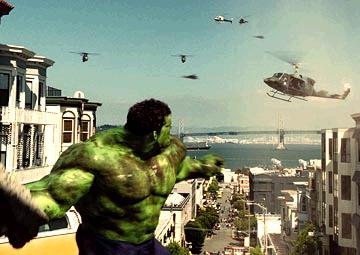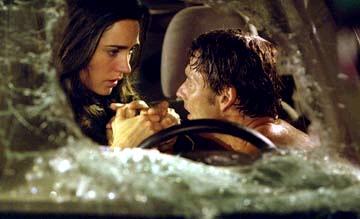

Somewhere during preproduction, Marvel Comics' The Incredible Hulk comic lost its adjective and became simply The Hulk. This simple change succinctly encapsulates the film itself. It doesn't deserve the title "incredible." There are lots of expensive special effects, a computer-generated Hulk, big name actors and Ang Lee as director, but, despite a considerable attempt by Lee to add dramatic tension into the story, The Hulk turns into the typical big, empty action spectacle that plagues theaters during the summer months. Most early Marvel Comics were a product of their time. The creators used the heroes and villains as allegories for things happening in the world. Stan Lee and Jack Kirby created the Hulk in 1960s in response to the uncertainty around the Cold War and weapons testing. The Hulk represented some primordial, uncontrollable sense of rage.
Lee (Crouching Tiger, Hidden Dragon, Ride With the Devil) was drawn to the tragic elements of the Hulk mythos. Bruce Banner (Eric Bana, Black Hawk Down, Finding Nemo) transformed into the Hulk when afflicted with rage, so he had to isolate himself from people in order to keep them safe. Lee and frequent collaborator James Schamus (Crouching Tiger, Hidden Dragon, Ride With the Devil) combined with screenwriters John Turman (Time Killer) and Michael France (Goldeneye, Cliffhanger) to add in a father-son element to the film in the character of David Banner (Nick Nolte, The Good Thief, Investigating Sex). Yes, this does add some much-needed depth to the genre, but also slows The Hulk's pacing to a crawl. Years ago, David experimented on himself, unknowingly passing on mutated genes to his son, who was adopted by other people so he had no knowledge of his father or his experiments.
Now, Bruce is a grown man and eerily studying in a field similar to that of his father. As an adult, Bruce is emotionally withdrawn and refuses to open up, which ended a relationship with Betty Ross (Jennifer Connelly, A Beautiful Mind, Requiem for a Dream), whom he still works with. Betty's old college flame Talbot (Josh Lucas, Sweet Home Alabama, A Beautiful Mind) is working with her father Gen. Ross (Sam Elliot, We Were Soldiers, The Contender) to appropriate their research for fiscal gain, when an accident irradiates Bruce with gamma rays, causing his transformation. It takes a while for events to get to this point, and the rest of the film is a prolonged chase sequence before a huge climax. Ironically, the government believes that the only way to stop the Hulk is to pummel him with various weapons into submission, when the only way to stop him is to calm him down, which begins his transformation back into Bruce Banner.
Bana caught the eyes of producers (and eventually won the role) with a deliciously psychotic turn in Chopper. Amusingly, he doesn't need to use the rage and madness of that role here, because the Hulk is entirely computer generated. Lee at times treats The Hulk like horror film, with the Hulk first glimpsed in darkness before a full unveiling. The CGI is pretty impressive, although the Hulk still manages to look "fake" in a rubbery sort of way when glimpsed in full light. Still, the range of emotion the Hulk's face is able to express and the interaction with people and the objects around him is impressive. And how do his pants always manage to stay on? On the whole, the acting is pretty light, with the script completely wasting Connelly's considerable talent and reducing her to a woman prone to crying.
The Hulk is a tad bit too long to be effective. Where some comic book adaptations are basking in the fun element of their source material, Lee opts to be more brooding and thoughtful, before launching into full action movie mode. This duality doesn't work well for the film, especially in the first half where he has to set everything up. There is little sense of balance between the two, and when the script launches into the resolution of the father/son conflict, everything begins to feel silly. He does cleverly use multiple panels, which has the effect of reminding people of The Hulk's comic book roots and conveying a greater sense of simultaneous action. He is a little hyperactive in his use of every imaginable type of wipe to go cut from one scene to the next, and this quickly becomes irritating. It sometimes feels as if Lee doesn't want to stay with one shot for any prolonged amount of time. The Hulk may not be one of the better comic book adaptations, but it is one of the more ambitious in that it attempts to inject some brains into the story. Ignoring this, it is another big dumb summer movie where the viewer can watch a big green monster withstand bullets and all sorts of other ammunition while trashing helicopters, tanks, and cities in the process.